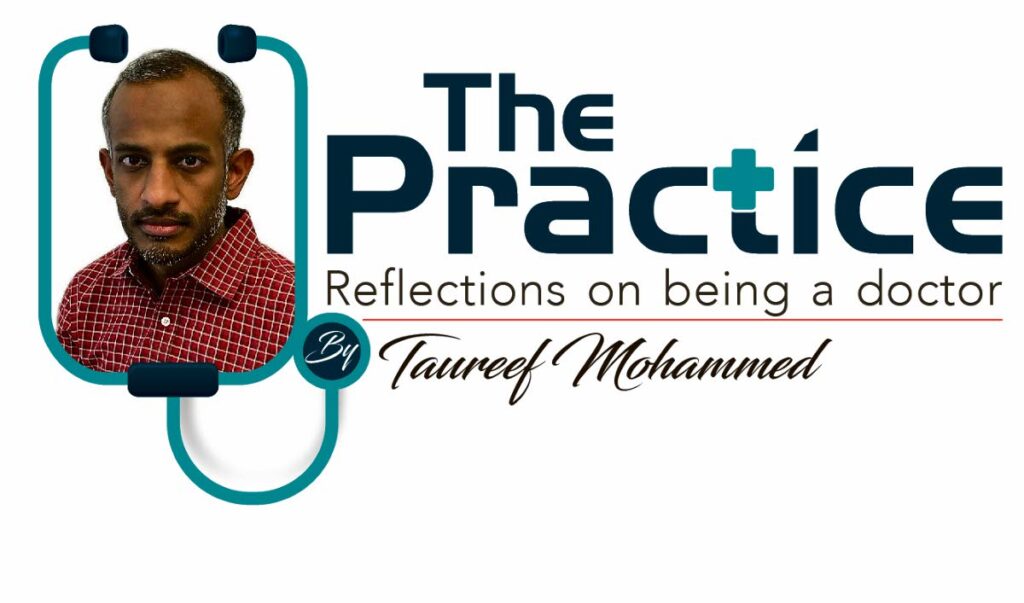Three heart attacks – and a delusional budget

Taureef Mohammed
I LEFT the middle-aged Indo-Trinidadian man sitting on the row of chairs facing the automatic sliding doors at the back entrance of the emergency department at Port of Spain General Hospital.
He was dressed in a shirt and pants and wore a cap; his legs were crossed. He looked comfortable.
He did not look like someone who would be dead a few hours later.
He had come into the emergency department at POSGH holding his chest, a few hours earlier, and tests had confirmed he was having a heart attack.
When I saw him, he had already received a cocktail of medications to “treat” (I will come back to this) the heart attack. As the medical intern on call, I had assessed him and written up the admission orders for him to be admitted to the ward.
After multiple pokes, I had finally secured an IV line, my last task for the night as it was nearing midnight, the end of my shift. I left him sitting on the row of chairs, looking not like a patient but a visitor, waiting for a bed on the ward.
Before sunrise, he had died. By the time I went back to the hospital for rounds with the rest of the team at 6 am, he was off our roster.
I knew what would have been on his death certificate: myocardial infarction. There was no need for me to ask what had happened: he had a heart attack, and people with heart attacks die if they don’t get an angiogram – performed by an interventional cardiologist, it is the standard treatment for a heart attack – in a timely manner. No cocktail of medications can substitute for an angiogram. This was in 2017.
Last year, on a visit home, I attended the funeral of a friend’s father. He was the same age as my parents. There is no need for me to repeat their story here, as it is the same story as above, except the hospital was Mt Hope, and my friend last saw her father walking and talking, not sitting, in the emergency room.
“A doctor called in the night and said he needed an angiogram. He said if we had $100,000 we can go private and get it faster.
“Where we getting $100,000 overnight?
“The next day they called and said come to the hospital. When we reached, they told us he had died.”
Myocardial infarction, she said, was on the death certificate.
Deja vu for me. Six years later, nothing had changed.
A few weeks ago, an old school friend called me in a panic. His elder brother had just been diagnosed with a heart attack and was in a ward at a public hospital.
Is this serious? What to do? What is going to happen next?
If you ever had a close relative admitted to hospital, you will understand the panic.
“You all have money?”
“Money is not a problem,” he replied.
“Check with the medical team, make sure your brother is stable, his vital signs are good, ask the team if it is safe to transport him, get a private ambulance if you can, and take him to a private hospital to get an angiogram as soon as possible.”
Within a few days, his brother was home, looking healthy as ever. He had had an angiogram within hours of being admitted to a private hospital. He lived.
And he lived because he had $100,000 in his bank account.
That is the reality of healthcare in Trinidad and Tobago. If you have money, you have a better chance of surviving.
I thought about these three cases when I read the health section of the 2025 budget. I looked for any sign that this tragic reality would soon be a thing of the past.
There was nothing. Nothing about investing in our young doctors to become interventional cardiologists. Nothing about developing our emergency services to treat heart attacks in a timely manner. Nothing about fixing the undignified reality of someone receiving a call overnight while their relative is in hospital to be asked if they have $100,000 for a life-saving procedure.
Instead, I read about digitisation; robots donated from India; blood-pressure machines donated from China; and white elephants throughout the country.
From a healthcare perspective, the five-hour-long budget was completely out of touch with reality – sad, but not unexpected from a government with a pathological sense of self-importance.
Taureef Mohammed is a physician from Trinidad and Tobago working in Canada.
E-mail: taureef_im@hotmail.com

Comments
"Three heart attacks – and a delusional budget"